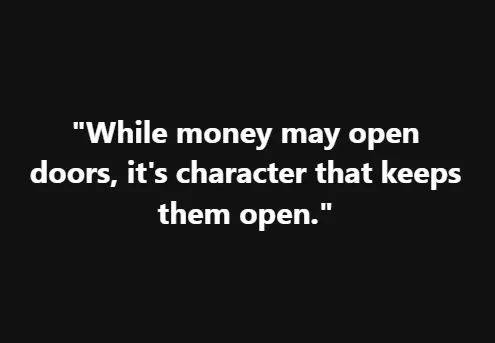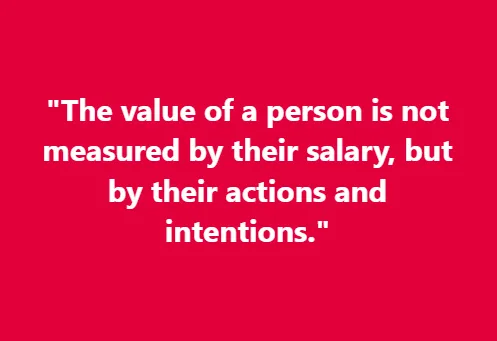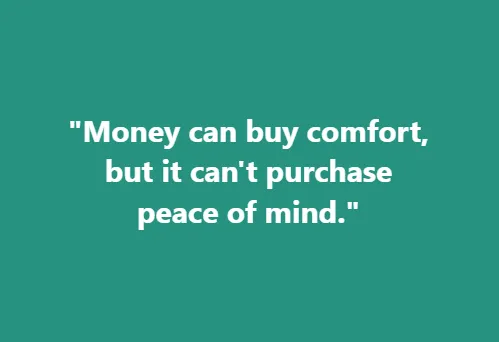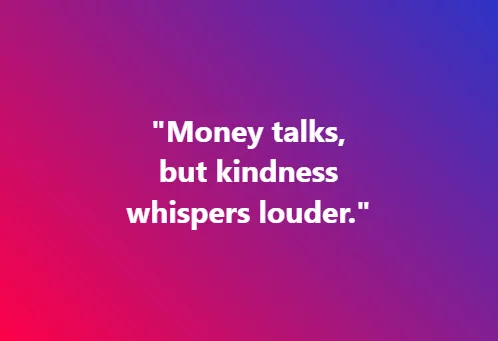Explore the most famous Money Makes Everything quotes. Find inspiration and wisdom in these 14 insightful quotes about the power of money. Dive in now!
Table of Contents
Money Makes Everything Quotes
Sure! Here are 14 incredible quotes about the power of money that will inspire and motivate you to achieve your financial goals:

1. Money is not everything, but it ranks right up there with oxygen. – Zig Ziglar
2. The lack of money is the root of all evil. – Mark Twain
3. Money can’t buy happiness, but it’s a lot more comfortable to cry in a Mercedes than on a bicycle. – Unknown
4. A wise person should have money in their head, but not in their heart. – Jonathan Swift
5. There are people who have money and people who are rich. – Coco Chanel
6. The only thing that stands between a man and what he wants from life is often merely the will to try it and the faith to believe that it is possible. – Richard M. DeVos Jr.
7. A successful man is one who makes more money than his wife can spend. A successful woman is one who can find such a man. – Lana Turner
8. Wealth consists not in having great possessions, but in having few wants. – Epictetus
9. I’d like to live as a poor man with lots of money. – Pablo Picasso
10. “Not he who has much is rich, but he who gives much.” – Erich Fromm
11. “Empty pockets never held anyone back. Only empty heads and empty hearts can do that.” – Norman Vincent Peale
12.“Many folks think they aren’t good at earning money when what they don’t know is how to use it.” —Frank A Clark
13.“Happiness is not in the mere possession of money; it lies in the joy of achievement, in the thrill of creative effort”– Franklin D Roosevelt
14.“When I had money everyone called me brother.”— Polish proverb
These quotes remind us of the importance and impact of money on our lives and encourage us to strive for financial success while keeping things light-hearted and positive!

Questions about money can make everything
Get answers to all your money questions and gain financial clarity. Explore our expert advice on navigating the complexities of personal finance.
What does the quote Money makes everything mean?
– Money makes everything quote prompts reflection on wealth’s role in life
– Money can ease problems but doesn’t guarantee happiness or fulfillment
– True contentment comes from connections, growth, and purpose, not just money
– Society often values material wealth over intangible qualities like love and empathy
– Money shapes experiences, but intrinsic qualities hold greater significance than wealth
The quote money makes everything provokes deep contemplation on the role of wealth in our lives. At first glance, it seems to suggest that financial resources are the ultimate solution to all problems and challenges. However, a closer look reveals the complex dynamics of money’s influence.
While money can certainly alleviate many difficulties and provide access to resources, it does not guarantee fulfillment or inner peace.
True happiness and satisfaction often stem from meaningful connections, personal growth, and purposeful living – elements that cannot be bought with mere currency.
It is important to recognize that societal measures of success often revolve around material wealth, leading to the perception that money holds supreme power.
Yet, this belief ignores the intangible aspects of life such as love, creativity, and empathy which carry immeasurable value.
Ultimately, while money plays a significant role in shaping our experiences and opportunities, its impact is not all-encompassing; there are intrinsic qualities within us that hold far greater significance than any monetary accumulation could ever offer.

Who is credited with the quote Money makes everything?
– The quote Money makes everything is attributed to various historical figures.
– Some credit Benjamin Franklin, others point to Aristotle.
– The quote reflects society’s enduring fascination with the power and influence of money.
– Money can provide access to resources and opportunities, but doesn’t guarantee happiness or fulfillment.
– It challenges us to consider other sources of value in life such as relationships and personal growth.
The quote Money makes everything has been attributed to numerous individuals throughout history, but its origin remains elusive.
Some attribute the quote to Benjamin Franklin, who famously remarked, A penny saved is a penny earned.
Others believe it may have originated from the Greek philosopher Aristotle, who suggested that wealth enables one to acquire everything they desire.
Regardless of its origins, this quote has endured through the ages, reflecting society’s enduring fascination with the power and influence of money.
However, rather than embracing a cynical view that money is the ultimate solution to all problems, it’s essential to critically evaluate this assertion.
While money can certainly provide access to resources and opportunities, it does not guarantee happiness or fulfillment.
This notion challenges us to consider alternative sources of value in our lives and question whether true richness lies in material wealth or more intangible aspects such as relationships, experiences, and personal growth.
By contemplating these perspectives on money makes everything, we can gain a deeper understanding of its implications in our lives beyond mere financial transactions.
Is the statement Money makes everything universally true?
– Money doesn’t guarantee happiness, love, or fulfillment
– Pursuing wealth can lead to isolation and emptiness
– Joy and contentment can be found through non-monetary means
– True abundance encompasses more than material wealth
– Seek fulfillment through diverse experiences beyond financial gain
While it’s often claimed that money makes everything, this statement doesn’t hold universally true. While money can provide access to resources and opportunities, it doesn’t guarantee happiness, love, or fulfillment.
In many cases, the pursuit of wealth can lead to isolation and a sense of emptiness as individuals focus solely on financial success at the expense of personal relationships and well-being.
Moreover, there are countless examples of individuals who have found joy and contentment through non-monetary means such as creativity, community involvement, and spiritual fulfillment.
The role of money in our lives is significant, but it’s essential to recognize that its influence has limitations.
Ultimately, an understanding that true abundance encompasses more than material wealth can lead us to seek fulfillment through diverse experiences beyond financial gain.
How does the concept of Money makes everything relate to personal finance?
– Money has significant influence on personal finance and various aspects of life
– Effective financial management opens doors to opportunities
– Financial stability provides independence and confidence
– Struggling with money creates emotional and mental burdens
– Understanding money’s impact is crucial for sound financial decisions
– Long-term sustainability should be prioritized over short-term gratification
Money makes everything, or so they say. In the context of personal finance, this concept holds a significant truth. It underscores the undeniable influence that money wields over various aspects of our lives – from meeting basic needs to pursuing dreams and aspirations.
Personal finance is fundamentally linked to this idea as it directly impacts one’s ability to access resources, make choices, and secure a certain quality of life.
Managing finances effectively can open doors to opportunities that may otherwise remain out of reach, while poor financial decisions can lead to stress and limitations.
Furthermore, the concept of money makes everything emphasizes the interconnectedness of wealth with freedom and security in personal finance. Having financial stability offers a sense of independence and confidence in navigating life’s uncertainties.
Conversely, struggling with money can create emotional and mental burdens that permeate other areas of one’s life.
Therefore, understanding how money influences various facets of our existence is pivotal for making sound financial decisions that align with personal goals and values.
Ultimately, recognizing the impact of money on every aspect of our lives motivates individuals to approach personal finance wisely by prioritizing long-term sustainability over short-term gratification.

Are there any famous individuals who have endorsed the idea that Money makes everything?
– Kanye West: Not having money is everything.
– 50 Cent: Money changes the way people treat you.
– Money’s absence creates challenges but its presence impacts social interactions and quality of life.
There are indeed several famous individuals who have expressed the sentiment that money makes everything, or at least many things, in life. One such figure is Kanye West, who once famously quipped, Having money isn’t everything, not having it is.
This statement reflects a belief that while money may not be the sole source of happiness or fulfillment, its absence can often create significant challenges and limitations.
Another notable endorsement of the idea comes from rapper 50 Cent, who asserted, I don’t like when people say money changes you; money changes the way people treat you.
This perspective highlights the impact of financial resources on one’s social interactions and overall quality of life.
While these endorsements may seem to emphasize materialistic values, they also shed light on the practical influence and significance of financial stability and opportunities in various aspects of life.
Can love and happiness truly be replaced by money as implied in the quote Money makes everything?
– Money can provide comfort and security, but not deep satisfaction and fulfillment of love and happiness
– True happiness comes from experiences, connections, and personal growth
– Pursuing money alone can lead to a shallow existence
– Money has little influence on areas that bring true happiness
– We should focus on balancing financial stability and emotional well-being
It’s tempting to think that money can replace love and happiness, but the reality is far more complex. While money can certainly provide comfort and security, it often falls short in delivering the deep satisfaction and fulfillment that love and happiness bring.
The joy of a heartfelt connection, the warmth of a loving relationship, and the contentment of genuine happiness are not easily replaced by financial wealth.
Moreover, the pursuit of money alone can lead to a shallow existence, devoid of meaningful relationships and emotional richness.
True happiness stems from experiences, connections, and personal growth – areas where money has little influence.
While we cannot deny the practical importance of money in meeting our basic needs, its ability to truly replace love and happiness remains questionable.
Rather than seeking to replace them with money, perhaps our focus should be on striking a balance between financial stability and emotional well-being.
How does societal inequality relate to the notion that Money makes everything?
– Societal inequality and belief in money’s power are deeply linked
– Financial status determines access to necessities, education, and healthcare
– Lower socioeconomic groups face limited agency and perpetuate inequality
– Money favors the wealthy and marginalizes those with limited resources
– Money decides success in legal disputes, education, and healthcare
– Systemic inequities reinforce the idea that money dictates access to resources
Societal inequality and the pervasive belief in the power of money are deeply intertwined. In a world where access to basic necessities, quality education, and healthcare is often determined by financial status, the notion that money makes everything becomes increasingly potent.
Those at the lower end of the socioeconomic ladder are consistently reminded of their lack of agency and opportunity due to financial constraints, perpetuating a cycle of inequality.
Furthermore, this mindset reinforces societal structures that favor the wealthy while marginalizing those with limited financial resources.
Whether it’s in legal disputes, educational opportunities, or even healthcare options, money can often be the deciding factor between success and struggle – effectively exacerbating existing social inequalities.
As such, while some may argue that hard work can overcome financial barriers, the reality is that systemic inequities continue to reinforce the notion that money dictates one’s ability to access essential resources and opportunities.

Is there a counterargument to the belief that Money makes everything?
– Money can provide material possessions and comforts, but not genuine happiness or fulfillment
– Excessive focus on wealth can lead to a loss of perspective on life
– Money can make some things easier or more accessible, but not guarantee emotional well-being
– The concept of everything is subjective and varies from person to person
– Financial wealth has limitations in addressing matters of the heart and soul
– Balance between material success and personal growth is crucial
While the belief that money makes everything may hold true in many aspects of life, there is a counterargument to this notion that cannot be overlooked.
It’s important to recognize that money can indeed afford material possessions and comforts, but it often fails to provide genuine happiness, fulfillment, and meaningful relationships. In fact, excessive focus on wealth can lead to a loss of perspective on what truly matters in life.
While money can make some things easier or more accessible, it cannot guarantee emotional well-being or spiritual contentment.
Moreover, the concept of everything is subjective and varies greatly from person to person. What one individual perceives as the ultimate achievement through monetary means might not hold true for someone else.
This suggests that while money may have its significance in certain areas of life, it cannot universally encompass all human desires and aspirations.
It’s crucial to acknowledge the limitations of financial wealth in addressing matters of the heart and soul, emphasizing the need for balance between material success and personal growth.

In conclusion, the 14 money makes everything quotes provide a thought-provoking insight into the complex relationship between wealth and happiness.
While some quotes emphasize the importance of financial security in achieving one’s dreams, others caution against prioritizing money over love and fulfillment. It is clear that money plays a significant role in our lives, but these quotes serve as a reminder that true contentment cannot be bought.
Ultimately, it is essential to strike a balance between financial success and personal well-being, recognizing that money is just one aspect of a fulfilling life. Let us reflect on these quotes and strive to cultivate a mindset that values happiness and fulfillment above all else.
FAQs About Money
Get your money questions answered with our comprehensive FAQs. Find expert advice on saving, investing, budgeting, and more. Don’t miss out!
Q: What is the best way to save money?
A: The best way to save money is by setting a budget and sticking to it, as well as regularly putting a portion of your income into a savings account.
Q: How can I improve my credit score?
A: You can improve your credit score by paying bills on time, reducing debt, and checking your credit report for errors.
Q: What are some common mistakes people make with their finances?
A: Common mistakes include overspending, not having an emergency fund, and neglecting to invest for the future.
Q: Is it better to save or invest money?
A: It’s important to both save and invest money. Saving provides a safety net for emergencies, while investing allows your money to grow over time.
Q: How can I reduce my monthly expenses?
A: You can reduce monthly expenses by cutting unnecessary spending, negotiating bills, and finding more affordable alternatives for services.
Q: What are the benefits of creating a financial plan?
A: Creating a financial plan helps you set goals, track progress, and make informed decisions about your money management.
Q: What should I consider when choosing a financial advisor?
A: When choosing a financial advisor, consider their qualifications, experience, fees, and whether they have a fiduciary duty to act in your best interest.
Q: How can I teach my children about money management?
A: Teach children about money management by setting an example, involving them in family budgeting discussions, and providing opportunities for them to earn and manage their own money.
